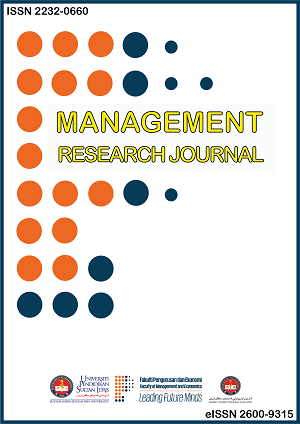Opportunities and Challenges in Tertiary Education in the Era of Society 5.0 in the Malaysian Higher Education Context
Peluang Dan Cabaran Pendidikan Tinggi Di Era Society 5.0 Dalam Konteks Pendidikan Tinggi Di Malaysia
DOI:
https://doi.org/10.37134/mrj.vol11.2.7.2022Keywords:
Tertiary education, Opportunities, Challenges, Society 5.0Abstract
The requirement to provide tertiary education in Malaysia in the future specifically in order to face the era of Society 5.0 is of utmost importance and aligned with the nation’s growth. With that in mind, the discussion in this paper focuses on the opportunities and challenges in facing the era of Society 5.0. The data sources were related articles, books and e-books. The data was analysed based on the study objectives and themes by using critical discourse analysis. The findings showed that there were five opportunities and challenges which should be handled at the tertiary education level. One of the opportunities in Society 5.0 would be the creation of fields of study based on Society 5.0, career and curriculum opportunities, the generation of gig economies and the further empowerment of lifelong learning. The main challenges would include graduate quality and competence, identity crisis, the democratization of education and technological infrastructure. The role of organisational leadership would also be discussed to manage and face Society 5.0 especially when it involves four management functions in the organisation. The implication of this paper would be to provide input and recommendations to manage Society 5.0 in Malaysia especially in the field of tertiary education.
Downloads
References
Al Faruqi, U (2019), “Future Service in Industry 5.0”. Jurnal Sistem Cerdas, vol 2(1), pp 67-79
Ariadi Nugraha and Fuad Aminur Rahman (2021). Application Development of Student Learning Skills in Era Society 5.0. J. Phys.: Conf. Ser. 1779 012014 DOI 10.1088/1742-6596/1779/1/012014
Carlsen, A., Holmberg, C., Neghina, C., & Owusu-Boampong, A. (2016). Closing the gap: Opportunities for distance education to benefit adult learners in higher education. Hamburg, Germany: UNESCO Institute for Lifelong Learning.
Fairclough, Norman. (1995). Critical Discourse Analysis: The Critical Study of Language. Longman: Routledge.
Fraile, M.N., Peñalva-Vélez, A., & Lacambra, A.M.M. (2018). Development of digital competence in secondary education teachers’ training. Education Sciences, 8(3), 1-12.
Garcia-Morales, V. J., Martín-Rojas, R., & Lardón-López, M. E. (2018). Influence of social media technologies on organizational performance through knowledge and innovation. Baltic Journal of Management, 13(3), 345-367.
Ismail, N., Makhsin, M., Noor, A. M., Ismail, U. S., & Halim, W. M. A. W. (2022). Program Pementoran Islam Rakan Sebaya Sebagai Medium Pendidikan Adab Di Era Society 5.0. International Journal of Education, Psychology and Counseling, 7 (46), 545-560.
Hung, N.T. (2007). Understanding lifelong learning: A perspective on the world today and Vietnam. Korean Journal of Educational Policy, 4(2), 9-16.
Kanwar, A., Balasubramanian, K., & Carr, A. (2019). Changing the TVET paradigm: New models for lifelong learning. International Journal of Training Research, 17, 54-68
Keidanren, (2016). Society 5.0 for SDGs, Keidanren, Yokyo.
Makhbul, Z. M., Hasun, F. M., & Latif, M. N. A. (2018). Pengurusan Sumber Manusia Hijau Mendepani Industri 4.0. Paper presented at the The 5th International Conference on Management and Muamalah 2018 (ICoMM 2018), Bangi, Selangor.
Mukhlasin, A. (2019). Kepemimpinan Pendidikan di Era Revolusi Industri 4.0. Jurnal Tawadhu, 3(1), 674-692.
Nair, A. K. Tyagi and N. Sreenath, (2021)."The Future with Industry 4.0 at the Core of Society 5.0: Open Issues, Future Opportunities and Challenges," 2021 International Conference on Computer Communication and Informatics (ICCCI), 2021, pp. 1-7, doi: 10.1109/ICCCI50826.2021.9402498.
Nurdin, A. (2021). Modernization of Islamic Higher Education in Indonesia at A Glance: Barriers and Opportunities. International Journal of Multicultural and Multireligious Understanding, 8(3), 288-296.
Pereira A.G., Lima T. M., Santos F. Ch., (2020). Industry 4.0 and Society 5.0: Opportuni-ties and Threats. International Journal of Recent Technology and Engineering, 8(5), s. 3305-3308, DOI:10.35940/ijrte.D8764.018520
Rahim, H. A., Yahaya, S., Borhanordin, A. H., & Bakar, N. T. A. (2021). Transformation of Islamic higher education institutions in facing the era of Industrial Revolution 4.0. International Journal of Academic Research in Business and Social Sciences, 11(2), 311-319.
Rizka, M., Kinanti, S., & Kencana, A. L. (2021). Penguatan pendidikan karakter dalam menghadapi standardisasi pendidikan menuju era human Society 5.0. Web Seminar (Webinar) “Standarisasi Pendidikan Sekolah Dasar Menuju Era Human Society 5.0,” 447–452.
Sarwar-Aalam, M. D., Wang, D., & Rafique, K. (2019). Chinese one belt-one road scholarship initiative and its impact on sustainable development of the education industry. Paper presented at the ACM International Conference Proceeding Series, 263267.
Schraeder, M., Self, D. R., Jordan, M. H., & Portis, R. (2014). The functions of management as mechanisms for fostering interpersonal trust. Advances in business research, 5(1), 50-62.
Shafiei, M. F., & Norwani, N. M. (2019). Kepimpinan Dalam Era Revolusi Industri 4.0. Jurnal Dunia Pengurusan, 1(3), 1-8.
Spante, M., Sofkova, S., Hashemi, M. L., Lundin, M., & Algers, A. (2018). Digital competence and digital literacy in higher education research: Systematic review of concept use. Cogent Education, 5, 1-21.
Trilling, B., & Fadel, C. (2009). 21st century skills: Learning for life in our times. San Francisco: Wiley.
Watson, D. (2007). The future for lifelong learning. Adults Learning, 19(3), 21-23.
Zaliza Zubir & Rohizah Halim (2020). Analisis wacana kritis: Satu pengenalan umum. Journal of Communication in Scientific Inquiry. 2(1), 57-64
Downloads
Published
Issue
Section
License
Copyright (c) 2022 Jamal Nordin Yunus

This work is licensed under a Creative Commons Attribution-NonCommercial-ShareAlike 4.0 International License.





